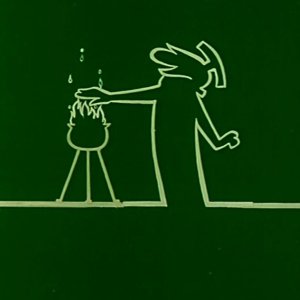What to do when you feel your relationship and your life has reached a breaking point?
This is not a happy story.
(tw: depression, child abuse, chronic illness)
This short film, like most short films, leaves a lot of meaning unspoken and questions unanswered.
That means if you can't find a connection to the struggles of at least one of the two main characters, this film might be hard to "get".
The characters have to deal with illness (of the mind and of the body), their own and their partners; with prejudice toward their sexuality and towards their profession.
What to do if, on top of all of this, you feel trapped in your relationship? When you feel that you lose yourself, bit by bit?
Will you go on a long-distance journey or stay with your partner?
The pain of the characters is apparent in every movement of their faces and bodies. The minimal music and the cold late autumn surroundings underline their bleak situation.
One thought about the plot: I was completely thrown by the twist in minute 20, which made a lot of things about the woman much clearer. I had to rewatch the whole film just to understand her better.
I'm not sure I like what her ending scene implies about a possible connection between that twist and her sexuality, but maybe I'm reading too much into it.
(Edit: After thinking about this some more, I arrived at an even sadder coclusion about her life and her decisions. Another point in favour of this film. Made me think, and question what I saw.)
And a thought about the subtitles: Those on GagaOOLala are not good. They are good enough to understand the plot, but the obvious grammar mistakes make me wonder if there are nuances that pass me by just because of the bad translations.
I also wonder about the subtitles for the ill partner. We get them, and know what he says, but the main character doesn't (he says so during the therapy session) -- so, does the Korean version have subs for the partner's sentences? Or do international viewers know more than the main character AND Korean viewers?
Overall, I found the story extremely painful and bleak. And I can understand why some viewers don't like it -- for those who have experienced at least some of the characters' struggles, the film might give a better connection to the themes.
The excellent acting and production alone is worth it, I think. (According to the info on GagaOOLala, this film was awarded the Grand Prize of the 2020 Ansan Dan-won International Cultural Art&Film Festival, so it can't be just mid.)
I'd suggest that you try it, it's just 29 minutes, after all.
(tw: depression, child abuse, chronic illness)
This short film, like most short films, leaves a lot of meaning unspoken and questions unanswered.
That means if you can't find a connection to the struggles of at least one of the two main characters, this film might be hard to "get".
The characters have to deal with illness (of the mind and of the body), their own and their partners; with prejudice toward their sexuality and towards their profession.
What to do if, on top of all of this, you feel trapped in your relationship? When you feel that you lose yourself, bit by bit?
Will you go on a long-distance journey or stay with your partner?
The pain of the characters is apparent in every movement of their faces and bodies. The minimal music and the cold late autumn surroundings underline their bleak situation.
One thought about the plot: I was completely thrown by the twist in minute 20, which made a lot of things about the woman much clearer. I had to rewatch the whole film just to understand her better.
I'm not sure I like what her ending scene implies about a possible connection between that twist and her sexuality, but maybe I'm reading too much into it.
(Edit: After thinking about this some more, I arrived at an even sadder coclusion about her life and her decisions. Another point in favour of this film. Made me think, and question what I saw.)
And a thought about the subtitles: Those on GagaOOLala are not good. They are good enough to understand the plot, but the obvious grammar mistakes make me wonder if there are nuances that pass me by just because of the bad translations.
I also wonder about the subtitles for the ill partner. We get them, and know what he says, but the main character doesn't (he says so during the therapy session) -- so, does the Korean version have subs for the partner's sentences? Or do international viewers know more than the main character AND Korean viewers?
Overall, I found the story extremely painful and bleak. And I can understand why some viewers don't like it -- for those who have experienced at least some of the characters' struggles, the film might give a better connection to the themes.
The excellent acting and production alone is worth it, I think. (According to the info on GagaOOLala, this film was awarded the Grand Prize of the 2020 Ansan Dan-won International Cultural Art&Film Festival, so it can't be just mid.)
I'd suggest that you try it, it's just 29 minutes, after all.
Considerați utilă această recenzie?


 2
2











